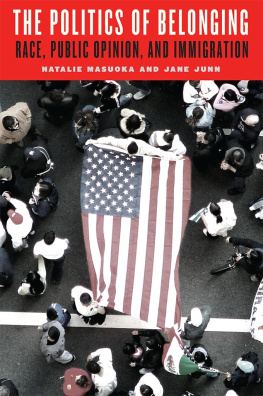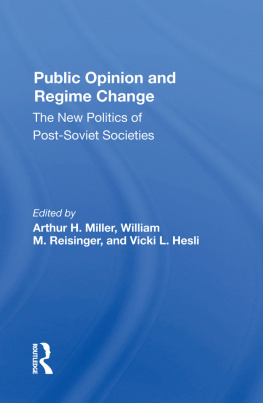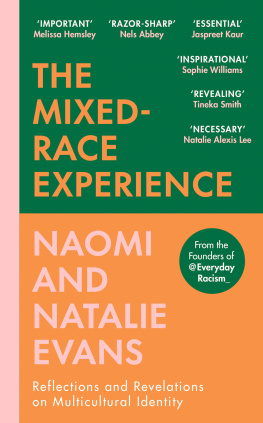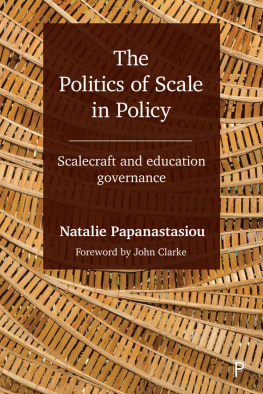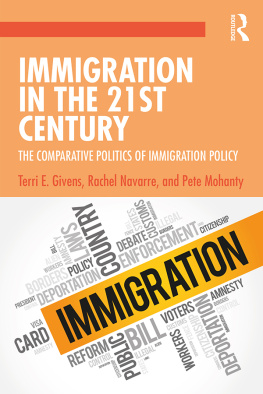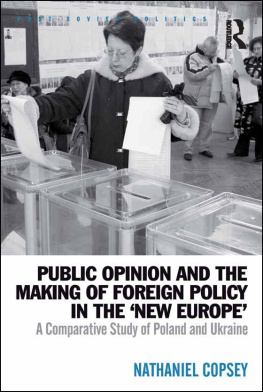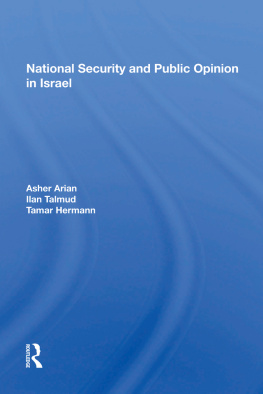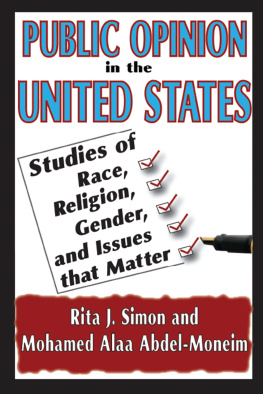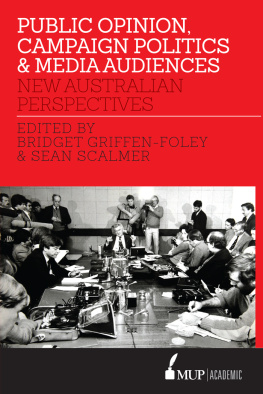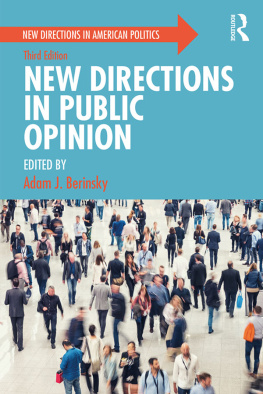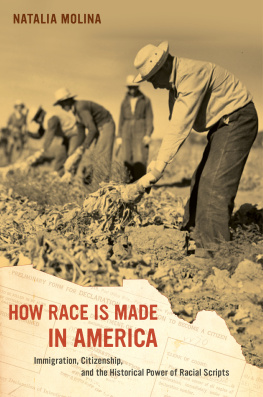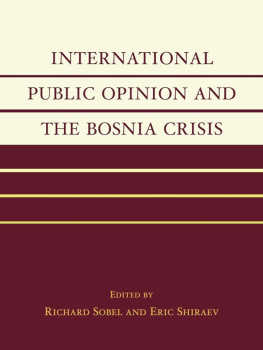NATALIE MASUOKA is assistant professor of political science at Tufts University.
JANE JUNN is professor of political science at the University of Southern California. She is coauthor of Education and Democratic Citizenship in America.
The University of Chicago Press, Chicago 60637
The University of Chicago Press, Ltd., London
2013 by The University of Chicago
All rights reserved. Published 2013.
Printed in the United States of America
22 21 20 19 18 17 16 15 14 13 1 2 3 4 5
ISBN-13: 978-0-226-05702-6 (cloth)
ISBN-13: 978-0-226-05716-3 (paper)
ISBN-13: 978-0-226-05733-0 (e-book)
Library of Congress Cataloging-in-Publication Data
Masuoka, Natalie.
The politics of belonging : race, public opinion, and immigration/Natalie Masuoka and Jane Junn.
pages. cm.(Chicago studies in American politics)
ISBN 978-0-226-05702-6 (cloth: alk. paper)ISBN-978-0-226-05716-3 (pbk. : alk. paper)ISBN 978-0-226-05733-0 (e-book)
1. United StatesEmigration and immigrationGovernment policy. 2. RacePublic opinion. I. Junn, Jane. II. Title. III. Series: Chicago studies in American politics.
JV6483.M334 2013
325.73dc23
2013005907

This paper meets the requirements of ANSI/NISO Z39.48-1992 (Permanence of Paper).
CHICAGO STUDIES IN AMERICAN POLITICS
A series edited by Benjamin I. Page, Susan Herbst, Lawrence R. Jacobs, and Adam J. Berinsky
titles follow index
Also in the series:
CHANGING MINDS OR CHANGING CHANNELS? PARTISAN NEWS IN AN AGE OF CHOICE by Kevin Arceneaux and Martin Johnson
POLITICAL TONE: HOW LEADERS TALK AND WHY by Roderick P. Hart, Jay P. Childers, and Colene J. Lind
THE TIMELINE OF PRESIDENTIAL ELECTIONS: HOW CAMPAIGNS DO (AND DO NOT) MATTER by Robert S. Erikson and Christopher Wlezien
LEARNING WHILE GOVERNING: EXPERTISE AND ACCOUNTABILITY IN THE EXECUTIVE BRANCH by Sean Gailmard and John W. Patty
ELECTING JUDGES: THE SURPRISING EFFECTS OF CAMPAIGNING ON JUDICIAL LEGITIMACY by James L. Gibson
FOLLOW THE LEADER? HOW VOTERS RESPOND TO POLITICIANS POLICIES AND PERFORMANCE by Gabriel S. Lenz
THE SOCIAL CITIZEN: PEER NETWORKS AND POLITICAL BEHAVIOR by Betsy Sinclair
THE SUBMERGED STATE: HOW INVISIBLE GOVERNMENT POLICIES UNDERMINE AMERICAN DEMOCRACY by Suzanne Mettler
DISCIPLINING THE POOR: NEOLIBERAL PATERNALISM AND THE PERSISTENT POWER OF RACE by Joe Soss, Richard C. Fording, and Sanford F. Schram
WHY PARTIES? A SECOND LOOK by John H. Aldrich
NEWS THAT MATTERS: TELEVISION AND AMERICAN OPINION, UPDATED EDITION by Shanto Iyengar and Donald R. Kinder
SELLING FEAR: COUNTERTERRORISM, THE MEDIA, AND PUBLIC OPINION by Brigitte L. Nacos, Yaeli Bloch-Elkon, and Robert Y. Shapiro
Acknowledgments
We like to think of our partnership as one that was meant to be; Masuokas parents, Jane and Jun, together share the second authors name. Beyond the names coincidence, our collaboration in researching and writing this book has spanned eight years and three US presidential elections, beginning with data collection in 2004 and ending in the completion of the book in 2012.
During the time we have spent together researching and writing this book, much has changed for us: babies were born, PhD dissertations were completed, first jobs started, coast-to-coast moves made, loved ones passed, and unions formed. Throughout, we have relied on the steadfast support of colleagues, friends, and family who invited us to present our work, listened to our ideas, suggested improvements to the analysis and writing, and generally helped us write this book both through conversations and their own work. For close readings and extended comments on earlier drafts of the book manuscript, we are very grateful to Jeb Barnes, Dennis Chong, Lisa Garca Bedolla, Bernie Grofman, Jennifer Hochschild, Catherine Paden, Kay Lehman Schlozman, and Ron Schmidt, Sr. Thanks to both Efren Perez and Nimah Mazeheri for expert advice on research methodology. We thank Mike Dennis and Bill McCready at Knowledge Networks for helping us administer our 2006 Faces of Immigration Study. For excellent research assistance, we thank Peter Kim, Sehreen Ladak, Vladimir Medenica, and students in the University of Southern California (USC) political science honors seminar.
We also express our appreciation for comments and conversations with Marisa Abrajano, Mike Alvarez, Saladin Ambar, Kristi Andersen, Sara Angevine, Jeb Barnes, Matt Barreto, Justin Berry, Cristina Beltran, Ben Bishin, Denise Blood, Larry Bobo, Jake Bowers, Rachelle Brooks, Nadia Brown, Niambi Carter, Dennis Chong, Juvenal Cortes, Jeronimo Cortina, Kareem Crayton, Vicky DeFrancesco Soto, Louis DeSipio, Marika Dunn, Alexandra Filindra, Luis Fraga, Megan Francis, Lorrie Frasure, Andra Gillespie, Christina Greer, Christian Grose, Zoli Hajnal, Ange-Marie Hancock, Kerry Haynie, Rodney Hero, Marc Hetherington, Krista Jenkins, Martin Johnson, Michael Jones-Correa, Alisa Kessel, Claire Kim, Peter Kim, Byongha Lee, Christine Lee, Taeku Lee, Jan Leighley, Pei-te Lien, Tehema Lopez, Lydia Lundgren, Michel Martinez, Paula McClain, Vlad Medenica, David Meyer, Sangay Mishra, John Mollenkopf, Norman Nie, Stephen Nuno, Manuel Pastor, Sasha Patterson, Francisco Pedraza, Dianne Pinderhughes, Karthick Ramakrishnan, Ricardo Ramirez, Emily Renaud, Kathy Rim, Reuel Rogers, Jen Schenk Sacco, Mark Sawyer, Kay Schlozman, Gary Segura, John Skrentny, Candis Watts Smith, Rogers Smith, Chris Stout, Liz Suhay, Katherine Tate, Dan Tichenor, Al Tillery, Sid Verba, Roger Waldinger, Marty Wattenberg, Nick Weller, Cara Wong, and Janelle Wong.
Thanks to the many places that have allowed us to present ideas discussed in this book: the political science and government departments at Duke University, Harvard University, University of California Irvine (UCI), University of California Los Angeles, University of California Riverside, University of California San Diego, University of California Santa Barbara, Texas A&M, the Department of Psychology at Brandeis University, and the Health Quality Life Lab at Tufts University. We also appreciate the feedback we received at conference presentations at the meetings of the American Political Science Association, Midwest Political Science Association, and Western Political Science Association, the New York Area Political Psychology meeting, and the Politics of Race, Immigration, and Ethnicity Consortium.
At the University of Chicago Press, we thank John Tryneski, the green flash of political science editors, who saw potential in our argument from the beginning and continued to encourage us to write a great book. We are very grateful to Jamie Druckman for wise, substantive, and strategic counsel at all stages of the process and for sacrificing sleep and his own work to help us meet a tight deadline. We thank Rodney Powell for his care and thoughtfulness in the preparation of the manuscript for production. George Roupe, copyeditor extraordinaire, helped us to improve the flow of the argument and the quality of writing, and we are grateful for the care he took editing the manuscript. Last, but certainly not least, we are grateful to the anonymous reviewers for the University of Chicago Press, who demonstrated that the peer-review process is alive and well, and whose trenchant and constructive critique motivated us to undertake substantial revisions and reach the full potential they recognized in our ideas.
 This paper meets the requirements of ANSI/NISO Z39.48-1992 (Permanence of Paper).
This paper meets the requirements of ANSI/NISO Z39.48-1992 (Permanence of Paper).
